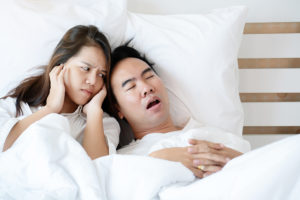Do I have sleep apnea if I snore?


When you do determine that sleep apnea is causing you to still feel exhausted even after spending eight or more hours in bed, you should explore all of your treatment options. Consult with a dentist to learn about the ones that can be easily integrated into your lifestyle, such as oral appliance therapy.
The Most Common Symptoms Of Sleep Apnea
Snoring can be a big sign that you have sleep apnea. It’s likely that a sleeping partner will alert you to this symptom. You may even pick up on changes in their behavior or mood because their sleep is being disrupted by your snoring.
In addition to snoring, other common symptoms of sleep apnea include:
- Fatigue, low energy and motivation
- Feeling drowsy even shortly after your wake up
- Sore throats or headaches after waking
- Difficulty focusing
- Increased sadness, irritability or anxiety
Clearly, sleep apnea can be detrimental to your quality of life, leaving you drained and depleted as you try to manage your day-to-day responsibilities. Your physical health may also suffer, so it’s essential to complete a sleep study to determine whether you have sleep apnea.
Getting Treatment For A Good Night’s Rest
The next step after you get your diagnosis is exploring your treatment options. Your dentist may be able to help you avoid an unwieldy CPAP device. Non-compliance with the CPAP is quite high, so don’t consider it a sign of failure if you’ve been unsuccessful at adapting to this treatment.
Many patients respond well to oral appliance therapy as a CPAP alternative, because it only requires them to wear a custom-made mouthguard while they sleep.
Others may benefit from expansive orthodontics, which eliminates the apnea-inducing conditions by creating more room in the arch of the jaw, thereby reducing the risk of airway blockage.
Know that you have a number of viable options for sleep apnea treatment that can give you (and your sleeping partner) relief from your snoring and any other sleep apnea effects you may be experiencing. Schedule a visit at Crosspointe Sleep Solutions to learn more about them.